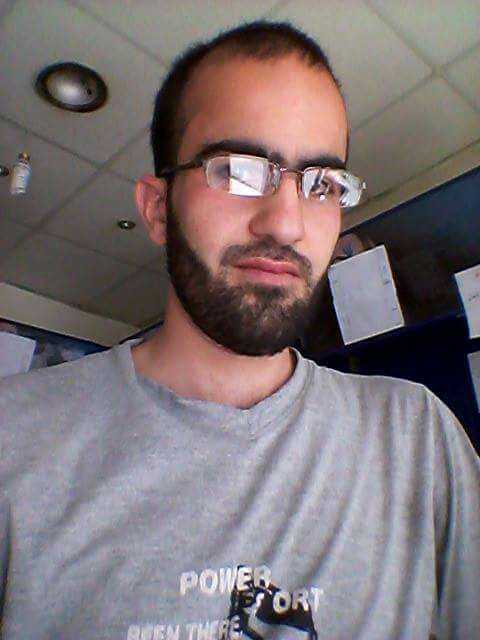One of Madaya’s critically injured speaks out: ‘We’re human beings, not just numbers to be moved around’
On a Friday afternoon one year ago this month, Ibrahim […]
23 March 2016

After serving for six months, Abbas, who supports the revolution, fled to his hometown of Baqin and later to nearby Madaya.
But on Friday, March 7, 2015, his priority was to make it to the mosque in time when a sniper’s bullet tore through his intestines.
Emergency surgery saved his life, but Abbas was left with a hole in his stomach exposing his large intestine. He now uses a colostomy bag, of which there are almost none in Madaya.
Despite surrendering to the Syrian regime last September, Madaya remains blockaded. That means nothing and no one enter or exit without the government’s permission. The 40,000 civilians trapped inside rely entirely on the goodwill of the Syrian regime to eat, and in the case of Ibrahim Abbas, for permission to leave the town to get the surgery he needs to stay alive beyond the short term.
That permission has been denied, without further detail. The regime has allowed three groups of the most medically urgent to leave Madaya, but more than 100 people, including Abbas, remain.
“I need an operation as soon as possible to return my intestines to their proper place,” Abbas tells Syria Direct’s Ammar Hamou.
“I suffer from a number of difficulties owing to my injury, and to malnutrition. I often come down with spasms that cause extreme pain, more than I could possibly describe. I’m not comfortable sleeping, I can’t run or do even the most basic sorts of exercise. I feel like I’m alone, and no one cares about me,” Abbas says.
The Syrian Arab Red Crescent (SARC) handles medical evacuations for Madaya, and did not respond to requests for comment. A spokesman for the International Committee for the Red Cross in Damascus said that the ICRC had “informed SARC about two cases” inside Madaya requiring urgent care, but did not elaborate further.
In his own words, Ibrahim Abbas:
I was injured on March 7, 2015—a Friday. I was going to Friday prayers, and was hit by a sniper round in my stomach that cut up my intestines. The doctors removed the injured portion, and conducted an anastomosis operation for my large intestine. Right now I’ve got an opening in my stomach from which part of the large intestine is coming out. A colostomy bag is attached to this opening.
My situation was critical after the surgery because of a lack of necessary medicines. I suffered from heavy inflammation and painful spasms, and remained in bed—unable to move, forbidden to eat or drink for a month and a half.
They installed a nasogastric tube during this period so I could receive anti-inflammation IV medicine, but the medicine was expired.
There were no fruits or vegetables because of the siege, and medicines were few and far between. Before I was injured I weighed 165lb. After the injury I was 110lb, and now after I’ve gotten a bit better, my weight is 143lb.
Currently there are no colostomy bags in the field hospital. I have one bag in poor condition. You’re supposed to change the bag once a week. I’ve been using this bag for an entire month.
My brother took care of me while I was being treated. But then our house was hit by a mortar shell that killed my brother, and injured me again with shrapnel.
Currently my situation is stable, to a degree. But I need an operation as soon as possible to return my intestines to their proper place. I’m still working as a citizen journalist, reporting on the events that are occurring in my encircled area.
I suffer from a number of difficulties owing to my injury, and to malnutrition. I often come down with spasms that cause extreme pain, more than I could possibly describe. I’m not comfortable sleeping, I can’t run or do even the most basic sorts of exercise. I feel like I’m alone, and no one cares about me.
Three rounds of injured people were evacuated from Madaya. I’m still here, and there’s another, similar case—a women in her thirties, but her situation is worse because she was struck by mortar shrapnel all across her body.
We’re human beings, not just numbers to be moved around. We don’t need aid or humanitarian campaigns, we need the world to look at us with humane eyes. We need the world to appreciate, and understand our situation. I’m a young man, 26 years old, and until now I’ve done nothing in my life, and I feel like I’m an old man of 60.
I finished my studies and graduated with very high marks in information technology from the Mutawassit Center. At the beginning of the revolution I worked in teaching and technical support.
The regime arrested me at the end of 2012 and forced me to join the army. I served for six months, then fled at the beginning of 2013 and returned to my hometown of Baqin, next to, and administratively a part of, Madaya.
I committed myself to civil resistance and worked as an independent citizen journalist. Currently I’m an activist with a civilian project called Ammirha.
Q: How do you feel about the war?
This isn’t a war, it’s a revolution belonging to people who came out to demand the most basic rights—freedom, equality, and life with dignity. I’m with this revolution until my last breath; on the other hand, I hope it ends as soon as possible and in a way that satisfies everyone. Five years is enough in my opinion.







